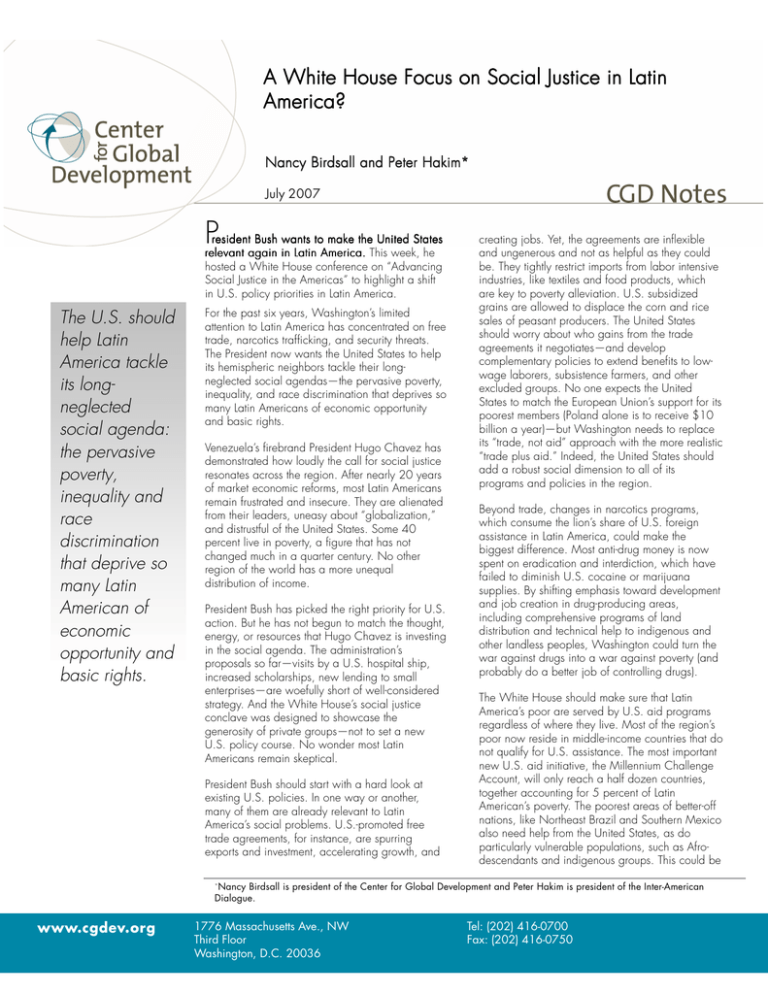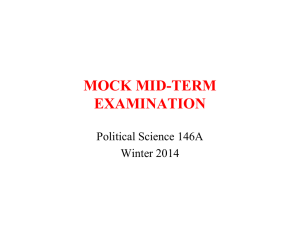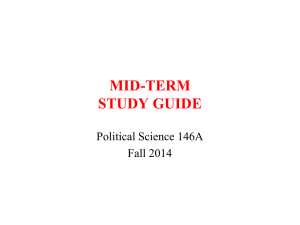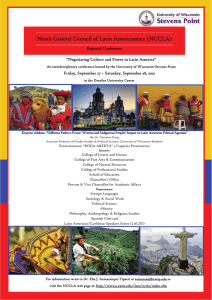A White House Focus on Social Justice in Latin
advertisement

A White House Focus on Social Justice in Latin America? Nancy Birdsall and Peter Hakim * Hakim* July 2007 P resident Bush wants to make the United States relevant again in Latin America. This week, he hosted a White House conference on “Advancing Social Justice in the Americas” to highlight a shift in U.S. policy priorities in Latin America. The U.S. should help Latin America tackle its longneglected social agenda: the pervasive poverty, inequality and race discrimination that deprive so many Latin American of economic opportunity and basic rights. For the past six years, Washington’s limited attention to Latin America has concentrated on free trade, narcotics trafficking, and security threats. The President now wants the United States to help its hemispheric neighbors tackle their longneglected social agendas—the pervasive poverty, inequality, and race discrimination that deprives so many Latin Americans of economic opportunity and basic rights. Venezuela’s firebrand President Hugo Chavez has demonstrated how loudly the call for social justice resonates across the region. After nearly 20 years of market economic reforms, most Latin Americans remain frustrated and insecure. They are alienated from their leaders, uneasy about “globalization,” and distrustful of the United States. Some 40 percent live in poverty, a figure that has not changed much in a quarter century. No other region of the world has a more unequal distribution of income. President Bush has picked the right priority for U.S. action. But he has not begun to match the thought, energy, or resources that Hugo Chavez is investing in the social agenda. The administration’s proposals so far—visits by a U.S. hospital ship, increased scholarships, new lending to small enterprises—are woefully short of well-considered strategy. And the White House’s social justice conclave was designed to showcase the generosity of private groups—not to set a new U.S. policy course. No wonder most Latin Americans remain skeptical. President Bush should start with a hard look at existing U.S. policies. In one way or another, many of them are already relevant to Latin America’s social problems. U.S.-promoted free trade agreements, for instance, are spurring exports and investment, accelerating growth, and creating jobs. Yet, the agreements are inflexible and ungenerous and not as helpful as they could be. They tightly restrict imports from labor intensive industries, like textiles and food products, which are key to poverty alleviation. U.S. subsidized grains are allowed to displace the corn and rice sales of peasant producers. The United States should worry about who gains from the trade agreements it negotiates—and develop complementary policies to extend benefits to lowwage laborers, subsistence farmers, and other excluded groups. No one expects the United States to match the European Union’s support for its poorest members (Poland alone is to receive $10 billion a year)—but Washington needs to replace its “trade, not aid” approach with the more realistic “trade plus aid.” Indeed, the United States should add a robust social dimension to all of its programs and policies in the region. Beyond trade, changes in narcotics programs, which consume the lion’s share of U.S. foreign assistance in Latin America, could make the biggest difference. Most anti-drug money is now spent on eradication and interdiction, which have failed to diminish U.S. cocaine or marijuana supplies. By shifting emphasis toward development and job creation in drug-producing areas, including comprehensive programs of land distribution and technical help to indigenous and other landless peoples, Washington could turn the war against drugs into a war against poverty (and probably do a better job of controlling drugs). The White House should make sure that Latin America’s poor are served by U.S. aid programs regardless of where they live. Most of the region’s poor now reside in middle-income countries that do not qualify for U.S. assistance. The most important new U.S. aid initiative, the Millennium Challenge Account, will only reach a half dozen countries, together accounting for 5 percent of Latin American’s poverty. The poorest areas of better-off nations, like Northeast Brazil and Southern Mexico also need help from the United States, as do particularly vulnerable populations, such as Afrodescendants and indigenous groups. This could be Nancy Birdsall is president of the Center for Global Development and Peter Hakim is president of the Inter-American Dialogue. * www.cgdev.org 1776 Massachusetts Ave., NW Third Floor Washington, D.C. 20036 Tel: (202) 416-0700 Fax: (202) 416-0750 done, for example, by scaling up the programs of the Inter-American Foundation, a low-budget U.S. government agency that supports grassroots groups almost everywhere in Latin America. Senator Bob Menedez’s proposal for a regional social development fund deserves attention as well. Fur ther Reading Further There are many other pro-poor initiatives that the President and his advisors should consider—but three priorities stand out in Latin America: Liliana Rojas-Suarez, (2007), The Provision of Banking Services in Latin America: Obstacles and Recommendations, CGD Working Paper 124, Washington DC: Center for Global Development. ¾Upgrading Upgrading education. Across the region, the dismal quality of education frustrates economic growth and social mobility, and almost everywhere is reinforcing inequality. U.S. support for both policy reform and public and private sector innovation would be helpful. Nancy Birdsall, Augusto de la Torre, Rachel Menezes, Fair Growth: Economic Policies for Latin America’s Middle-Income Majority, Washington DC: Center for Global Development, forthcoming fall 2007. Nancy Birdsall and Liliana Rojas-Suarez, Financing Development: The Power of Regionalism, Washington DC: Center for Global Development, 2004. ¾Getting etting crime under control. Latin America’s upsurge of street crime and deadly violence may be more devastating to the region’s poor than unemployment and discrimination. Every country could make use of funds for police training and judicial reform, and would benefit from U.S. efforts to reduce arms exports and manage better the deportation of convicted felons to the region. ¾Banking Banking the unbanked. The $60 billion a year in remittances sent from the United States to Latin America are almost all transfers among family members. They should not be counted as public or private aid. But the U.S. government could sharply enhance their social impact by taking measures to expand the numbers of low-income families in the United States and the region who have bank accounts. In the end, however, no matter how supportive U.S. policies are to Latin America’s poor majority, Washington can only make a difference if the region’s own governments, corporations, and civil societies make the social agenda their priority. www.cgdev.org 1776 Massachusetts Ave., NW Third Floor Washington, D.C. 20036 Tel: (202) 416-0700 Fax: (202) 416-0750






